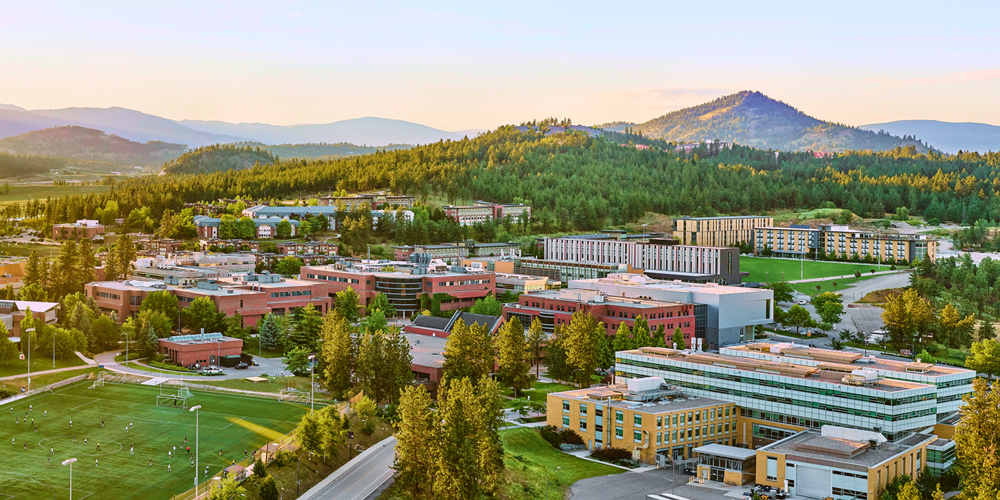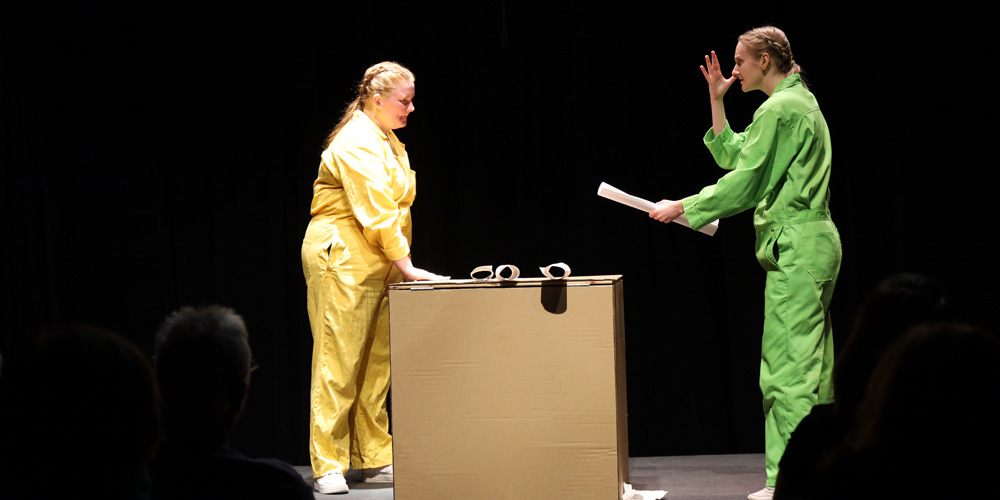Theatre
Degree
Bachelor
Length
4 years
Faculty/School
Faculty of Creative and Critical Studies
Complement your studies with a creative, practice-based, collaborative and cross-cultural education. Students are given the opportunity to combine their academic studies with creative and practice-based contemporary performance theory and practice.
Small studio classes provide an intimate, collaborative and transformative learning environment through experiential, interdisciplinary and cross-cultural curriculum.
Performance and communication skills such as body awareness, vocal expression, and creative problem solving are powerful tools for students of any discipline.
Theatre courses offer experiential learning opportunities in non-profit cultural organizations, arts-based education, cultural outreach and community engagement, enabling students to acquire transferrable skills valued on the job market.
Degree Options
Undergraduate students can take classes in theatre as electives to compliment any undergraduate degree, or complete a 30-credit minor, which is is open to students majoring in English, Cultural Studies, Art History and Visual Culture, Creative Writing, Psychology, Education, Health, and Management.
Sample Courses
To complete a Minor in Theatre, students must take 6 credits in THTR courses at the 100 level; 6 credits in THTR courses at the 200 level; and 18 credits at the 300 and 400 level.
Below are some examples of our courses. To view the list of courses you can enrol in during your studies, visit the Academic Calendar.
An introduction to acting techniques pertaining to the style of psychological realism for stage and screen. Instruction includes practical exercises on and off camera, as well as lectures, workshops, screenings, discussions and written work pertaining to acting for stage and screen. This course aims to equip students with the physical, vocal, emotional and intellectual tools for improvisation, character development, and the enactment of contemporary theatre and film scripts. The course is project driven and it explores theory and practice within the context of actual creation. Learning is structured to simulate the various stages of rehearsal and production.
This skills-based course gives students the opportunity to develop and strengthen skills in preparing and presenting public oral presentations for academic, business, theatrical and social settings. It is well suited to students for whom English is an additional language as well as students who might have anxiety about speaking in public. Students will become better listeners as well as speakers and will learn to adapt to different contexts and audiences more comfortably. While students workshop their written texts, the eventual performance of those texts as a communicative event is the focus of the work, with an emphasis on skills required for reading or performing texts and the underlying dynamics of the relationship between performer and audience. To this end, the course aims to develop and strengthen the student’s free and natural voice through physical and vocal training techniques.
This course explores creative arts methodologies and skills for the purposes of multi-modal understanding, communication, mediation, problem-solving, and constructive engagement with and between particular communities and disciplines. It builds on the knowledge that these strategies are not merely translation devices, but are integral to all aspects of environmental science and activism. It draws out the communication challenges and opportunities of the students’ own sustainability knowledge and values. The course is practice-based and students learn through hands-on experience as well as studio exercises, class discussions, lectures, assignments and readings. Instruction includes three hours of instudio work per week as well as field work outside the classroom setting.
What is the connection between a Truth and Reconciliation march, a Black Lives Matter protest, the Pride Parade, the Olympic Games, a graduation ceremony, and social networking? These are all performances in which we play important roles that shape who we are, what we do, how we do it, and why. Explore the interdisciplinary field of performance studies, which includes aesthetic, ritual, and everyday life performance practices.
ADMISSION, FEES, APPLYING
You could soon be studying at one of the world’s top universities. Be sure to review the content below to prepare for attending UBC Okanagan.
Admission Requirements
Already applied? Check your status or accept your offer.
EXPERIENTIAL LEARNING
Expand your horizons while studying abroad, conducting meaningful research, or working in the community with your UBC colleagues.
Learn more about Co-op, Go Global, Undergraduate Research Awards and other opportunities at Experiential Education.
Through courses in theatre, students create, rehearse, and perform their work in public. The Public Theatre Project (PTP) aims to foster cross-faculty collaboration and build a sense of community, encouraging interdisciplinary collaboration, and provide creative tools and outlets that contribute to student well-being. This is a great opportunity for people to meet one another, engage in conversation, practice speaking on things that are important to them, to take positive risks in a supported environment, and to provide space for students to co-create, express and make connections

DISCOVER THE OKANAGAN
A diverse natural region with sandy beaches, beautiful farms, vineyards, orchards and snow-capped mountains, the Okanagan is an inspirational landscape perfect for those seeking leisure or outdoor adventure.
UBC’s Okanagan campus borders the dynamic city of Kelowna, a hub of economic development with a population of more than 150,000 people— the fourth fastest-growing population in Canada.
Already applied? Check your status or accept your offer.

